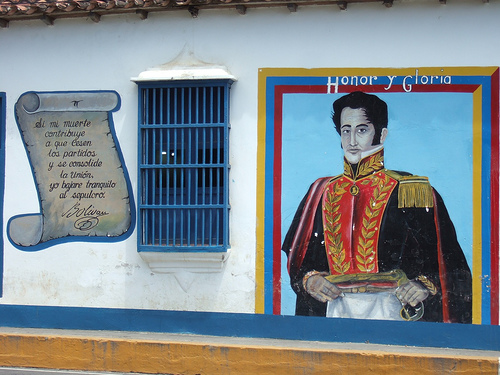The Bolivarian Revolution for Dummies
by Israel Centeno and translated by Kelly V. Harrison / March 26, 2013 / No comments
Israel Centeno explains the basics of revolution via a hypothetical Q and A.

A mural dedicated to Simon Bolivar, the 19th century Venezuelan leader whose policies were the foundation of the Bolivarian Revolution. Photo: User schlymay on Flickr.
Why does revolution set people against other people?
Because it’s a revolution.
Why don’t they negotiate?
Revolution doesn’t negotiate; it imposes.

- From his lonely watch post Albert Camus asked who among us has not experienced exile yet still managed to preserve a spark of fire in their soul. “We’re all alone,” Natalia Sedova cried in exile on hearing of her husband Leon Trotsky’s affair with Frida Kahlo. In his novel Night Watch, Stephen Koch follows the incestuous love affair of David and Harriet, wealthy siblings watching the world from their solitary exile. Koch’s writing, Camus’s theories, and Trotsky’s affair all come back to exile and lead me to reflect on the human condition. From my own vantage point, my Night Watch, I will reflect on my questions of exile, writing, and the human condition.

- Israel Centeno was born in 1958 in Caracas, Venezuela, and currently lives in Pittsburgh as a Writer-in-Residence with City of Asylum/Pittsburgh. He writes both novels and short stories, and also works as an editor and professor of literature. He has published nine books in Venezuela and three in Spain.
But revolutions are something good: Progress.
Myth: They are neither good nor bad. A revolution is the destruction of a paradigm.
Is it because they are incapable of governing?
True revolutionaries don’t govern; they start a revolution.
What is the first thing to be taken in a revolution?
The first thing seized is the voice of the people. Then, with that voice, they seize everything else.
What’s the motto?
The fight of the working classes against the rich.
Is revolution their future?
Revolutions invoke a past full of glory and equality in order to destroy a shameful and inhumane present and march towards a future full of glory and equality, invoked from the past. The revolution, in its narrative, is only an agent in the past.
Are revolutionary leaders progressive?
There was no being more conservative than Maximilien Robespierre and, to a certain extent, Stalin, Mao, Pol Pot, and Castro were conservative too.
Are revolutions bad, authoritative, military-based governments?
No, revolutions aren’t bad governments. When they’re effective, they’re good revolutions. They end, destroy, and devastate the “old order.” Dealing with a revolution by employing the same strategies as those used against bad governments is naïve, if not stupid.
Are revolutionaries mystical?
Revolutionaries, to all appearances, are obtuse, only acknowledging their truth. Consequently, their ambitions are narrow and they impose this truth with the authority and power bestowed upon them by the people.
Are revolutions pure?
Revolutions are corrupted with the dizzying rapidity of their bureaucratic growth. The leader is given—or appropriates—all the power of a hypertrophic State. Corruption is absolute in an absolute State with an absolute leader who introduces and teaches his absolute truth.
Is a revolution always a majority?
A revolution is always a majority, and it disowns, does away with, and ignores minorities. But the majority of a revolution is voiced by its vanguard, its party, the leader.
Why are revolutionaries popular icons?
Because they always promise a return to a pure, original state: Eden.
Why are revolutions so well regarded in the so-called first world?
They show their support from within liberal democracies with a mix of sympathy, guilt, and racism. They have considerable ignorance of the reality, which is so distant from their own, as well an almost basic notion of equality that they are unable to realize on their own doorstep. Generally, they believe the best thing is that these people can do it for themselves.
Are revolutions driven by a thirst for justice?
Some. But the majority are conceived through resentment caused by injustice and capitalized on by an embittered leadership.
Do revolutions promote peace?
Revolutions are universal truths fighting against universal lies, making them hegemonic. Triumph is only possible in the end if it is universal, which means that the leader of the revolution is obliged to propagate the revolution and devise ways to expand it.




